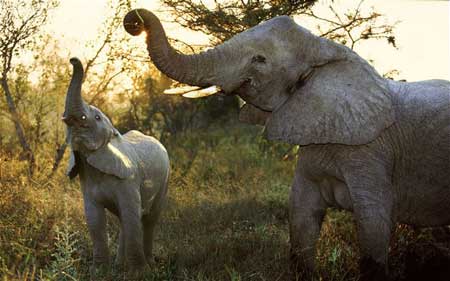
|
If you have ever wondered how an elephant smells, scientists have the answer. Pretty good. Researchers have discovered that African Elephants have the largest number of genes dedicated to smell of any mammal. Given the size of their trunks, and how important it is to their survival, it is probably unsurprising that an elephant’s nose is not only the longest in the animal kingdom, but also the most effective. In comparison, humans and other primates have a poor sense of smell. "The functions of these genes are not well known, but they are likely important for the living environment of African elephants," said author Dr Yoshihito Niimura of the University of Tokyo. "Apparently, an elephant's nose is not only long but also superior. The sense of smell is critical to all mammals, and they use it for sniffing out food, avoiding predators, finding mates and locating their offspring. In a study published in Genome Research, scientists examined the 13 mammal species and found that African Elephants have twice the number of smell genes as dogs and five times more than humans. They have around 2,000 genes alone that are dedicated to scent. Humans in comparison have just under 400 and other primates like chimpanzees, even less. The study found that 20,000 genes are responsible for the sense of smell in mammals, of which around half are functional, but the collections differ for each species. Horses have around 1,000 smell genes, rabbits around 750 and rats about 1,200. “The large repertoire of elephant (smell) genes might be attributed to elephants’ heavy reliance on scent in various contexts, including foraging, social communication, and reproduction,” added Dr Niimura African and Asian elephants possess a specific scent gland, called the temporal gland, behind each eye, and male elephants exude an oily secretion during annual mating, which is characterized by increased aggressiveness and elevated levels of testosterone . Research has also shown that elephants have well-developed olfactory systems that include large olfactory bulbs and large olfactory areas in the brain. And previous studies have revealed that, African elephants can reportedly distinguish between two Kenyan ethnic groups—the Maasai, whose young men demonstrate virility by spearing elephants, and the Kamba, who are agricultural people that pose little threat to elephants through smell. The sense of smell evolved over millions of years and our human ancestors would have used it as a tool to spot disease, avoid rotten meat and poisonous plants and sniff out food. However our upright posture lifted our noses far from the ground where most smells originate, diluting scent molecules in the air. And today many smells which still give us hints about rot and poor hygiene are masked behind perfumes, air fresheners and deodorants. Yet smells are still having a greater impact than we realise, warning of danger, triggering memories and even helping us choose a partner. Many studies have shown that pheromones emitted from the sweat glands play an important role in physical attraction. Some experts believe that humans have a far greater sense of smell than previously thought but daily showers and fridges, which mask bad odours, have stopped us noticing. Previously it was estimated that we could smell 10,000 odours but now researchers say it is more like one trillion. Scientists believe our sense of smell is much closer to that of animals than appreciated, but we no longer pay attention because smells are often hidden, meaning that important information is lost. Mammal Number of genes Elephant 1948 Cow 1186 Dog 811 Horse 1066 Rabbit 768 Guinea Pig 796 Rat 1207 Mouse 1130 Marmoset 366 Macaque 309 Orangutan 296 Chimapanzee 380 Human 396 |
如果你想知道大象是怎么聞氣味的,科學(xué)家們找到答案了。 據(jù)《每日電訊報(bào)》網(wǎng)站報(bào)道,研究人員發(fā)現(xiàn),非洲大象擁有數(shù)量最多的基因,這些基因有利于所有哺乳動(dòng)物的嗅覺。 鑒于其鼻子的大小以及其對(duì)他們生存的重要性,大象的鼻子不僅是動(dòng)物王國里最長的,它無疑也是嗅覺最靈敏的。 相比之下,人類和其他靈長類動(dòng)物的嗅覺較不靈敏。 該研究作者東京大學(xué)的吉人新村(Yoshihito Niimura)博士說,“這些基因的功能并不為人所熟知,但它們對(duì)非洲象的生存環(huán)境可能很重要。” “顯然,大象的鼻子不僅長,而且還更高級(jí)。” 嗅覺對(duì)所有的哺乳動(dòng)物都很關(guān)鍵。他們用鼻子來嗅出食物,躲避捕食者,尋找配偶甚至找尋他們的后代。 發(fā)表在基因組研究的研究中,科學(xué)家們研究了13種哺乳動(dòng)物,發(fā)現(xiàn)非洲大象的嗅覺基因數(shù)是犬類的兩倍,是人類的5倍。 他們大約有2000個(gè)基因,用于嗅出氣味。相比較而言,人類的嗅覺基因不到400個(gè),其他靈長類動(dòng)物比如猩猩,甚至還更少。 研究發(fā)現(xiàn),在哺乳動(dòng)物中,2萬個(gè)基因負(fù)責(zé)聞氣味,其中約一半的基因是功能性的,但這種集合在不相同的物種中各不相同。 馬大約有1000個(gè)嗅覺基因,兔子約有750個(gè)嗅覺基因家兔,而大老鼠約有1200個(gè) 。 新村博士補(bǔ)充說:“屬大型劇目的大象的(氣味)基因,可能是由于在各種情況下,大象對(duì)氣味的嚴(yán)重依賴。包括覓食,社交及再生育。” 非洲和亞洲大象擁有一個(gè)特殊的臭腺,稱為顳腺。顳腺在兩只眼睛的后面,公象在每年的交配期散發(fā)出一種油性分泌物,其特點(diǎn)是攻擊性增強(qiáng),睪酮水平升高。 研究還表明,大象有發(fā)達(dá)的嗅覺系統(tǒng),包括在大腦中的大型嗅球莖和嗅大區(qū)。 之前的研究顯示,據(jù)說,非洲象可以分辨兩個(gè)肯尼亞民族——馬賽族(Maasai)和康巴族(Kamba)。馬賽族的年輕人以刺戳大象展現(xiàn)男性氣概;康巴族人多從事農(nóng)耕,較少對(duì)大象造成威脅。非洲象能通過氣味分辨出來。 嗅覺進(jìn)化了數(shù)百萬年。而我們?nèi)祟惖淖嫦扔盟鳛榘l(fā)現(xiàn)疾病的工具,避免食用腐爛的肉和有毒植物并嗅出可食物。 然而,大多數(shù)氣味源自地面。我們?nèi)祟愡M(jìn)化的直立站姿讓我們的鼻子離地面較遠(yuǎn),氣味分子在空氣中被稀釋了。 如今,我們能聞出因?yàn)樾l(wèi)生條件差或者腐爛散發(fā)的味道。我們用香水、空氣清新劑和除臭劑掩蓋臭味。 然而,嗅覺仍比我們想像的影響還要大。它能意識(shí)到危險(xiǎn),引起回憶,甚至幫助我們選擇同伴。 許多研究表明,從汗腺發(fā)出的信息素對(duì)物理吸引力起著重要作用。 有專家認(rèn)為,人類的嗅覺比以前更靈敏了。但每天的淋浴和制冷掩蓋了不好的氣味,已經(jīng)讓我們不再意識(shí)到一些臭味了。 此前,據(jù)估計(jì),我們可以聞到10萬種氣味。但現(xiàn)在研究人員說,我們更可能聞到上萬億種氣味。 科學(xué)家們相信,人類的嗅覺比想象中更接近動(dòng)物的嗅覺。但我們不再專注于味覺研究對(duì)比,。因?yàn)闅馕督?jīng)常是隱藏的,也就是說,重要的信息都丟失了。 哺乳動(dòng)物的基因數(shù)量 大象 1948 牛 1186 狗 811 馬 1066 兔子 768 天竺鼠 796 大老鼠 1207 老鼠 1130 狨猴 366 獼猴 309 猩猩 296 黑猩猩 380 人類 396 掃一掃,關(guān)注微博微信
  (譯者 1193614809 編輯 齊磊) |
